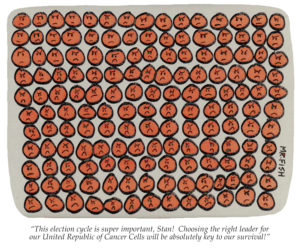Study: More U.S. Men Than Women Die of Cancer
This is one of those scientific categories in which it's better to come in second: According to a new study published in the journal Cancer Epidemiology, Biomarkers & Prevention, men in the U.S. are more likely to die of cancer than their female counterparts.
This is one of those scientific categories in which it’s better to come in second: According to a new study published in the journal Cancer Epidemiology, Biomarkers & Prevention, men in the U.S. are more likely to die of cancer than their female counterparts.
However, unlike other studies that attribute the gender divide in cancer mortality rates to differences between men’s and women’s preventive care strategies, as one example, the take-away in this case is that men develop some form of the disease more often than women, according to one of the cancer researchers who worked on the study. –KA
Your support matters…WebMD:
Our research suggests that the main factor driving greater frequency of cancer deaths in men is the greater frequency of cancer diagnosis, rather than poorer survival once the cancer occurs,” says study researcher Michael B. Cook, PhD, BsC, of the National Cancer Institute.
The study is published in Cancer Epidemiology, Biomarkers & Prevention.
Cook says that if investigators “can identify the causes of these gender differences in cancer incidence, then we can take preventative actions to reduce the cancer burden in both men and women.”
Independent journalism is under threat and overshadowed by heavily funded mainstream media.
You can help level the playing field. Become a member.
Your tax-deductible contribution keeps us digging beneath the headlines to give you thought-provoking, investigative reporting and analysis that unearths what's really happening- without compromise.
Give today to support our courageous, independent journalists.









You need to be a supporter to comment.
There are currently no responses to this article.
Be the first to respond.